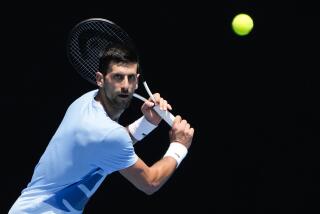Tennis Federation Rejects Players’ Demands : Wilander, Edberg Outspoken in Requesting Shift of Power in Men’s Council
- Share via
NEW YORK — The recent turmoil in men’s professional tennis resurfaced Monday, the first day of the U.S. Open, as the international governing body of tennis rejected the demands of the players’ union to assume control of the men’s game.
Saturday, the Assn. of Tennis Professionals (ATP), the players’ union, announced that it would leave the Men’s Tennis Council (MTC), the administrative body for men’s professional tennis, to start its own circuit in 1990 unless the council was restructured to give the ATP control.
Essentially, the ATP is trying to change the make-up of the MTC, asking for four ATP player representatives, three tournament representatives and two independent businessmen. That would limit the International Tennis Federation, the international body, to observer status with no voting power. Currently, the MTC has three ATP representatives, three tournament representatives and three ITF representatives.
The ITF considers its role on both the men’s and women’s councils as one of providing the balance between the interests of the players and the tournaments in which they compete.
In a five-page release, the ITF rejected this plan and also said it would not relinquish its right to administer men’s tennis as an equal partner with the players and the tournaments. The ATP had also demanded that the Grand Slam tournaments pool their television rights, which was also rejected by the ITF.
The ATP’s request to hold a press conference at the National Tennis Center in Flushing Meadow was denied by Open officials. So, today, the ATP will hold the press conference in a most unlikely place, the parking lot outside the main gate of the National Tennis Center.
Already, at least six of the world’s top players, including No. 2-seeded Mats Wilander and No. 3 Stefan Edberg, met over the weekend and pledged to back the movement.
“The main thing is that the top guys realize we want to do something to better the game for the players,” Wilander said. “The top guys want to do something to help the lower-ranked guys.
“The weapon we have is if we stick together and speak with one voice.”
Edberg, who was victimized by poor scheduling last year at the Open, was unusually vocal on this subject.
“We should be in control of our own destiny,” he said. “The ATP was founded for the players by the players, but it has no control. We’ve been continually told where to go . . . now we want our say.
“Everybody is behind (ATP executive director) Hamilton Jordan on this. What’s been my problem has been scheduling, particularly in relation to Davis Cup. There is no coordination. If a player knew where he was going to play in Davis Cup and where he was designated, it would be better.”
Earlier this year, Edberg was forced to travel to a tournament in Tokyo just after representing Sweden in Davis Cup play. And, in 1987, Wilander had to travel a long distance from a Davis Cup match to a Grand Prix tournament in Scottsdale, Ariz.
Edberg and Wilander stirred things up here last year when they went on a brief wildcat strike--delaying the start by about 10 minutes--before playing each other in the semifinals. They protested having to play at 10 a.m. Saturday after Edberg had played a five-set doubles final Friday and after both he and Wilander had played their quarterfinals Thursday. The other semifinalists, Ivan Lendl and Jimmy Connors, hadn’t played since Wednesday.
In the players’ minds, the villain in this case was CBS television, which wanted the Connors-Lendl contest as a featured match.
A year later, Edberg and Wilander are fighting what they perceive as another injustice.
The ATP, however, also acknowledged what the MTC has done for the game in addition to its demand for restructuring.
“It is amazing to us that the ATP can acknowledge all these positive benefits for the game and the players and now seek to destroy the entity that was responsible for these achievements,” said Philippe Chatrier, president of the ITF. “It is apparent that control of the game is their aim.”
But, in the final paragraph of the release, the ITF left room for a possible face-saving compromise with the ATP, saying:
“If the present structure of the MTC is no longer acceptable to ATP’s management, then the undersigned representatives of Wimbledon, the U.S. Open, the French Championships and the Australian Open will ask the ITF, the governing body of tennis for the past 75 years, to form a new structure to carry on the worldwide work for the game.”
More to Read
Go beyond the scoreboard
Get the latest on L.A.'s teams in the daily Sports Report newsletter.
You may occasionally receive promotional content from the Los Angeles Times.











